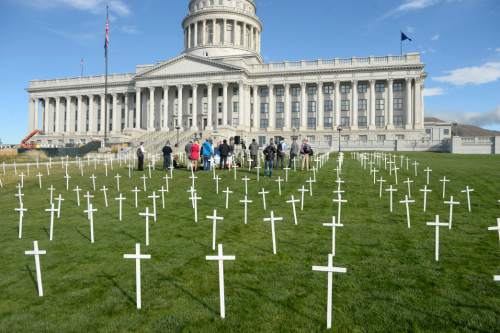This is an archived article that was published on sltrib.com in 2016, and information in the article may be outdated. It is provided only for personal research purposes and may not be reprinted.
The Utah Department of Health is taking public comments on the state's meager attempt to expand Medicaid coverage to some of the poorest of our poor.
The response has been, so far, underwhelming.
Sad, perhaps, but not really surprising. What is left to say?
That, since state Medicaid expansion became possible under the federal Affordable Care Act at the beginning of 2014, Utah taxpayers have walked away from nearly $705 million in offered federal subsidies.
That we've turned our backs on $796,789 per day that would have provided coverage to 110,000 uninsured Utahns.
That the subsidies Utah refused did not go to deficit reduction or lower taxes but to deserving people in states intelligent enough to seize the opportunity. (The latest of them being Louisiana, following up on a campaign promise from newly elected Gov. John Bel Edwards.)
That the plan that is being worked out, following the compromise approved by the last session of the Utah Legislature, will cover even fewer people than once thought — maybe 11,000 instead of 16,000 — because by targeting a population that's only the poorest and sickest, the state has taken on individuals who cost the most to cover.
That the plan the Legislature chose will cost the state $31.2 million in fiscal year 2018 and draw down $72.8 million to cover that handful of people. That's because it doesn't conform to the wide net envisioned by the ACA, and thus qualifies for much less of a federal match. If, that is, the plan is approved at all.
That the more humane and more rational options that included either straight Medicaid expansion or Gov. Gary Herbert's Healthy Utah alternative, either of which would have leveraged $14.5 million in state dollars to get $480 million from the feds, and cover something around 100,000 people.
That our Legislature, eyes wide open, chose to spend twice as much money to cover a tenth as many people and to gut the offered boost to the state's economy by 85 percent.
That influx — like all the federal dollars that flow to Hill Air Force Base, our national forests and parks, our IRS office and everything else — would not just pay for doctor visits and then vaporize. It would circulate through the state's economy, providing jobs, boosting tax bases and doing all the other things that Utah politicians are usually so keen to take credit for.
The plan that Utahns are being asked to comment on is the one set by House Bill 437. That disgrace was apparently all the Legislature could stomach after years of debate and denial. And even that, apparently, was only possible because of pressure from local governments seeking help with their homeless populations. And because lawmakers realized that the drug treatment, mental health care and other options they hoped to provide to some offenders as a way of keeping them out of expensive prison beds needed to be paid for somehow.
Comments will be accepted online through Wednesday via http://health.utah.gov/MedicaidExpansion. Comments can be submitted online or by email at medicaidadultexpansion@utah.gov.
Don't bother to tell the career public servants at the Health Department that the whole plan stinks. They know that. It's our elected officials who are in willful, for themselves, and deadly, for others, denial.



